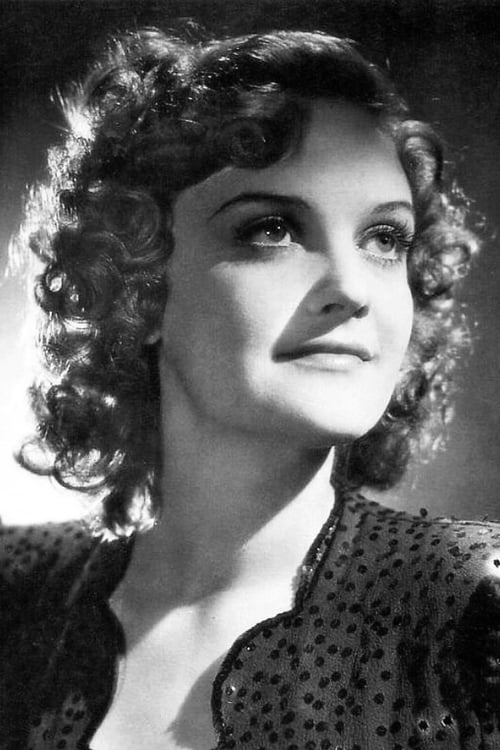
Klári Tolnay
Nacimiento : 1917-07-16, Budapest, Hungary
Muerte : 1998-10-27
Historia
Klári Tolnay (17 July 1914 – 27 October 1998) was a Hungarian actress.
Klári Tolnay (born Rózsi Tolnay) was born on 17 July 1914 in Budapest, as the daughter of István Tolnay and Eleonóra Siess. She spent her childhood in the small village of Mohora, Nógrád county, on the estate of her father. Finishing elementary school there, she continued secondary school studies in Balassagyarmat, two years at the school operated by Institutum Beatae Mariae Virginis in Nyíregyháza, finishing high school in Debrecen's School of Business. Singing and playing music since childhood, she followed the advice of newspaper editor János Bókay, and auditioned herself to prominent actors of the time, Gábor Rajnai, Jenő Heltai, and Sándor Hevesi. After these early attempts were not followed by desired results, she was mentored by Béla Gaál, thus starting her career as a film actress at the Hunnia Film Studio.
Her first notable role was in Meseautó, after which she was hired by the Vígszínház theatre in 1934, to perform smaller roles. In 1936 she married Ákos Ráthonyi, a director, giving birth to daughter Zsuzsanna 4 years later. After World War II ended in 1945, Ákos Ráthonyi left Hungary, with their daughter following after the 1956 revolution. Leaving the Vígszínház for the Művész Theatre in 1946-7, she met Iván Darvas, whom she later married (but divorced in 1958). In 1947, together with Gyula Benkő and István Somló, she was appointed as the co-manager of the Vígszínház theatre, where she was a major participant in restoring the institution to its pre-war glory. After the theatre was disbanded by the government in 1950, she joined the Madách Theatre, where she worked until her death on 27 October 1998.
Description above from the Wikipedia article Klári Tolnay, licensed under CC-BY-SA, full list of contributors on Wikipedia.
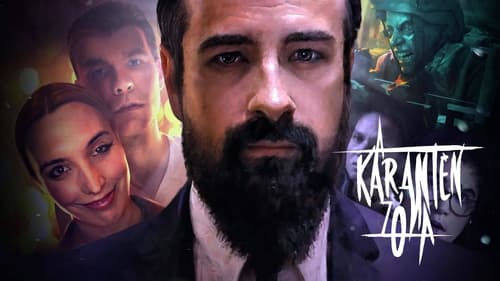
Panni

Verbéna
What would it feel like to be a bird and fly over the trees and housetops? A boy named Willy finds out when the Sparrow Guardian turns him into a Sparrow for shooting a BB gun at the little birds. Suddenly, Willy's own cat thinks of him as lunch but, luckily, some new sparrow friends rush to Willy's rescue. They deliver him to a grandfatherly old bird named Cipur who takes Willy under his wing, teaches him how to fly, and so much more. In return, Willy fulfills Cipur's lifelong dream for knowledge by teaching him ow to read. Willy's new friendship helps him understand that all creatures have feelings and deserve to be treated with kindness and respect. Before Willy is turned back into a boy, he leads the sparrows in a brave but perilous plan to retake their home in the barn from Blacky the cat. Finally, the Sparrow Guardian offers Willy a very special opportunity.

Matilde
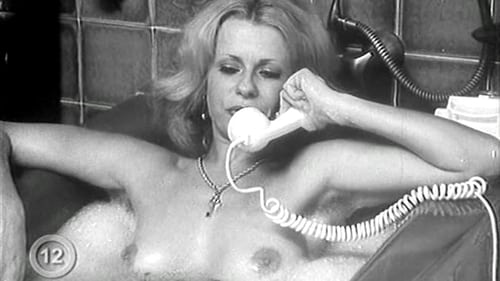
Szalánczyné
Lt. Kojak arrives in Budapest as a guest speaker for the 'International Crime Writers Conference'. Soon after he starts enjoying the pleasures that the city has to offer, he assists his old friends at the police department with a case. The case involves solving the murder of a noted scientist, unaware that a Mafia hit man and his female companion are targeting him.
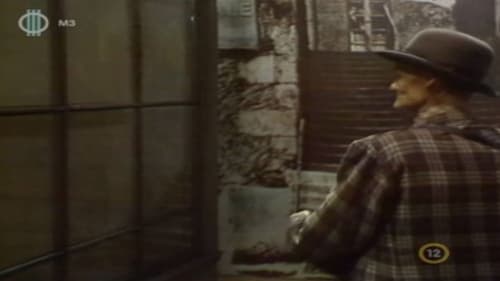
Mama

Zsazsa néni

Zarkóczy Rózsika
The university student couple, Andris and Mari, cross Nemesbérc during their summer vacation, to hasten the laying of a memorial stone to the memory of András's martyr father.

Teudelinda grófnő

Nagymama
A coming of age story about a young boy spending his summer vacation in the village.

Bujták grófnõ
This film describes the narrator's childhood, the years before and after the Hungarian Soviet Republic, in a burlesque and fabulous style and with the humour of a child's fantasy.

Juhászné
The film adapts a true story from the beginning of the 70s.

Kozima, Liszt leánya
This is a romantic biographical film about Franz Liszt. In a distinguished saloon of Paris, the unknown composer, Liszt, defeats the renown Thalberg at a piano competition. Through his playing, he wins the favours and later the hand of the countess D'Agoult. A daughter is born in their marriage, Cosima. Liszt is better and better known, Marie introduces him to the circle of artists.

Ilka néni
Aunt Ilka, who likes company, opens her house standing in the middle of a six-acre rose garden in the little town for the golden youth of the town. As a result of her benevolence, the tenants are in the position to adore not only the roses but a nice bunch of to-be-married girls of the town.

Anna - özvegy Komáromi Gézáné
The protagonists of a comic Romeo and Juliet story full of gags are two widowed pensioners. Nádor and Mrs. Komáromi meet in the cemetery while mourning their dead spouses and they fall in love.

Fölcint Lajosné

Babocsainé
In 1585 the Turks and Vallons are looting the Látrány region.

Mrs. Holló reports the case of three missing persons to the police. During the investigations, the captain realises that there is nothing to deter Mrs. Holló from her trying to overcome loneliness.
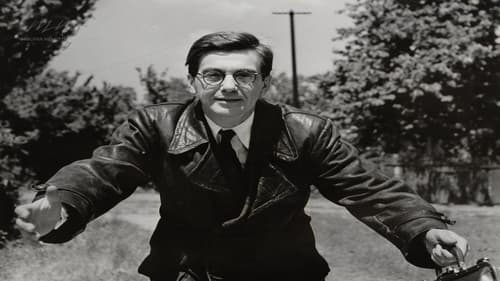
Anya
Un niño asiste al funeral de su padre en una Budapest arrasada tras los bombardeos de la Segunda Guerra Mundial recién finalizada. El fantasma del progenitor, convertido en figura heroica, sobrevuela constantemente la vida de Tako, convertido a su vez en héroe, por herencia paterna, a los ojos de los otros niños. En contra de lo que podría esperarse de este argumento, István Szabó huye deliberadamente de cualquier pretensión de solemnidad y se decanta por el terreno de la ironía y el absurdo en el relato vital del protagonista desde la niñez hasta los tiempos de joven universitario, con el trasfondo de la emergente figura de Stalin tras la guerra. (FILMAFFINITY)

Tóni, Vajkayné
Based on a novel by Dezso Kosztolani, this Hungarian drama is set at the turn of the 20th century. A young, homely woman lives at home with her mother and retired father. Because of all the care the girl provides for her parents, the couple becomes detached from the world outside their home. When the girl leaves for a short visit to her uncle's home, the parents realize the extent of their separation from society and their selfish feelings toward their own daughter.

Sándor Bálint's wife
Andris is almost an adolescent boy. He would need the trust and encouragement of his family. But his father is too much preoccupied with his moral problems in his job. He has the choice either to make a fuss about the corruption discovered at the company or he tries to cover it up skilfully.

A young woman on board of a bus notices that her watch has been stolen. The ticket collector keeps everybody on board, and upon the advice of a traffic police, they drive directly to the nearest police station.

Miklós' mother
The film is a ballad about the dwellers of a block-of-flats in Angyalföld.

Bende Etelka
The grey hero of grey workdays, the divorced cashier of a cinema who is always willing to sacrifice herself for others, Etelka, is awarded a two-week-holiday at Lake Balaton. Following the advice of her female friend, she tries to live life at full speed.

Anna, Kéri felesége
Daddy Kárász, the stakhanovist worker, complains in a television interview about the fact that his family, consisting of many members, cannot get a home on their own. Kéri, the chairman of the local authority, promises to help him on the condition that if he does not, they may move in to his villa at elegant Pasarét. Nothing happens, therefore the Kárász family takes Kéri by his word. From this time on, tumultuous scenes and frequent quarrels take place in the villa between the two families.

Elza, Szabó's wife

1922. Sándor serves as a farm-hand, but would like to become a blacksmith. He is completely enchanted by the beautiful wife of his new master.

Karsai Klára
Antal Tőrös, teacher of mathematics, does not like and trust people. No wonder he is not liked by anybody, either. Only his colleague, Klára takes a liking to him. Tőrös is in love with her, and to prove this, he tries to forget about his previous life-philosophy.

Aranka
Dani, the few-month-old little boy born outside marriage is left by Eszter in the lap of her companion on the train. The widowed Aranka takes him willingly to her. The child is already ten years old and has a good life with Aranka. Then Géza enters their life and he does not welcome the child of someone else.

Bartháné, patikus
The flat of Doctor Bartha is wetting, the Communal Management Enterprise does not act, the doctor and his wife are at the edge of divorce. Géza would marry his colleague, Kató, but mum is sick, the apartment is small, no money. Uncle Károly is fed up with unsuitable, charlatan business managers. Vali would marry, in order not to live on Titi and Piri any more, but the selected man wants to have a woman with her own apartment. All of them have a chance by the lottery, especially by hitting twelve scores.
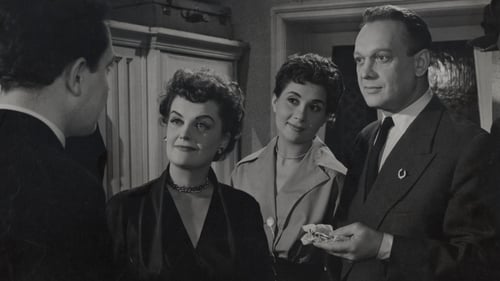
Márta
Varsa engineer receives the Kossuth award for his excellent work. His career once began at the family enterprise of his wife, so the woman invites her relatives for a dinner party.

The hero of the story taking place at the end of the twenties is the modest civil servant, doctor Kopjáss who is suddenly appointed to be the chief attorney of Zsarátnok city. He realises slowly that his immaculate name was needed as a cover for the corrupt loan transactions handled by the lords of the city.
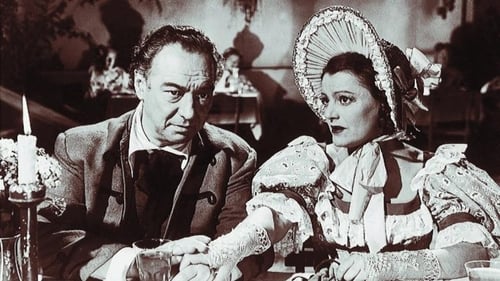
Déryné
The story, which takes place in the reform era, centres around Mrs. Déry, a legendary actress, who, along with her fellow actors and actresses, travels around the country to become the herald of the Hungarian language, performing in villages and towns up and down the land as strolling players, a woman who is not put off by the prospect of starvation and the dearth of a home to return to and security to live in.

Bangháné, Ilonka
Director: Imre Jeney

Asztalos Mária
1h 35min | 21 October 1948 (Hungary)

Apolka
The film evokes count Pongrácz, who, as late as the 19th century, managed to live a life, which reminds one of his medieval ancestor's values. He acts in defiance of the town by fighting his own battle against it, having been offended by the town.

Jánossy Éva

Eszter

Klára / Marianne

Varga Kató / Katyi
Kató Varga (Klári Tolnay) is unable to play its part in front of the Admissions Committee of the School of Dramatic Art. Geszty (Tivadar Bilicsi), severe President of the Commission maintains that she has no talent for acting and mercilessly tells you will never be an actress. Kató prepares to take revenge and under the false name of Katyi Csiba, dressed as a peasant village, obtains admission to the house Geszty. Turning everything upside down, she makes your life hell.

Kovács Zsuzsi
Pál Völcsöky comes home from Sweden to get his uncle's heritage, the castle. The valet, Joachim informs him that all members of the Völcsöky family have a right to spend two weeks of honeymoon here.

Kádár Erzsi ügyvéd

Éva

Count Vághelyi Gusztáv is now a member of the Carthusan order. He has to be there at her ex-sweetheart's, Betti's deathbed. Longing for penitence, he recalls his life so far.

Fifi, a vezérigazgató lánya
Ágnes, Vass and Kriszt run a sanatorium for consumptives. Fifi, daughter of the institute owner is also here, mortally ill. Feri, the ski trainer relieves her with his courtship every now and then from her boredom and distress.

Anny
Kovács, chief cashier, is celebrating the 30th anniversary of his school-leaving exams at the grammar-school. He takes his friends to a night-club.

Nadányi Ervinné, Anni

Kovalszky arrives at the Danube-Bank Hotel as a foreign gentleman. Two members of the staff, Miklós, the waiter and Anna, the house-maid are planning their life together. Kovalszky makes passes at Anna.

Nothing new under the sun. The famous 'Love Story' is only a faint reminder of the most successful pre-war Hungarian film. The relationship between the painter and the busy girl, as well as the third one, still holds surprises for us today.

Suzanne,francia nevelõnõ

Eva

A gróf felesége

Takács Klári, Bimbi

Éva, Bálint Gábor felesége

Teri
On the night before his wedding Tamás, a young teacher, saves a lonely girl named Teri from committing suicide. Since she has nowhere to go, he takes her back to his apartment and gives her some money. Another chance encounter with the girl complicates Tamás's honeymoon.

Gitta, Hubay Péter lánya
Gitta is 20 years old, a girl with modern attitudes, who is courted by Ferenc Fekete. Not particularly liked by Gitta's parents, especially her old-fashioned father, Fekete dates Gitta in secret.

Mary, Gruber leánya

Kántor Vera

Erzsike

Sári
A light hearted comedy, from the thirties. One of the most successful ones in Hungary. The ever enchanting story of a beautiful girl falling in love with a rich man.

Olgika

Róza néni










